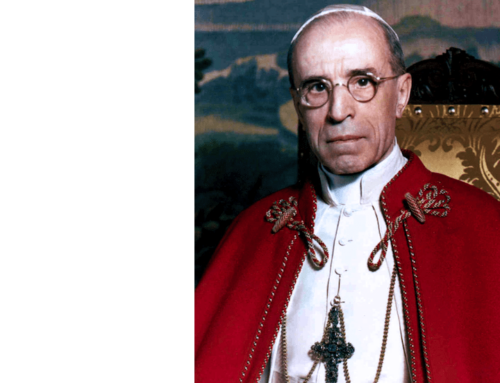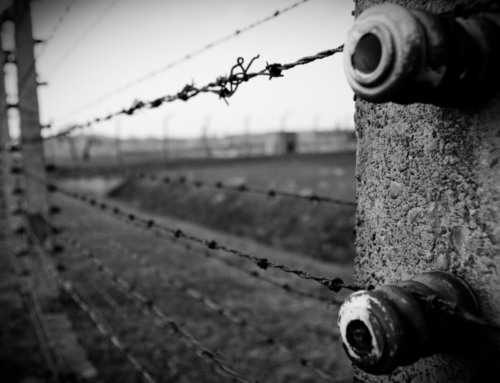By Sister Margherita Marchione
(June 1, 2007)
As the Vatican moves toward announcing the beatification of Pope Pius XII, some prominent American Jewish leaders continue to insist that the Church should desist from that long-overdue action. They claim that Pius was guilty of not doing enough to prevent Hitler’s genocide of Jews during the Holocaust. Even putting aside the impertinence of people from outside the Catholic faith like Abraham Foxman, executive vice president of the Anti-Defamation League, or Seymour Reich, past chairman of the International Jewish Committee on Interreligious Consultations, presuming to dictate to the Vatican whom the Church can or cannot beatify, the charges they levy against Pius XII are simply untrue. In reality, the wartime pope did far more to save Jews than did other leaders of the day, including people like Franklin Roosevelt and Winston Churchill, who, unlike Pius, had enormous military assets at their command. Yet for some incomprehensible reason, it is Pius, the only world leader who made sustained efforts to save Jews during the Holocaust, who is scapegoated for the world’s failure to act forthrightly in the face of evil. In an effort to counteract the inaccuracies of some historians, I have gathered documentation that proves how outrageously incorrect are the misrepresentations about Pope Pius XII’s so-called “silence” and “anti-Semitism.” In my book, Did Pope Pius XII Help the Jews? (Paulist Press, 2007), I proved that Pius XII was neither silent nor anti-Semitic. Just consider the testimonials of Jewish leaders of his day thanking him for his efforts, and the gratitude the 5000 Jews saved during the Nazi occupation of Rome evince for the Pope. They understood that the Pope had to be prudent while moving behind the scenes to protect as many Jews as he possibly could. Had he taken a more public and provocative stand, he would have infuriated Hitler and invited Nazi retaliation against the Vatican; thereby endangering the lives of thousands of Jews who, at his direction, were hidden in 155 convents and monasteries in Rome alone. In reality, Pius XII was a saintly man, a man of peace and compassion. He condemned strongly the anti-Semitic persecutions, the oppression of invaded lands and the inhuman conduct of the Nazis. He was a champion of peace, freedom, human dignity. He encouraged Catholics to look on Christians and Jews as their brothers and sisters, all children of a common Father. For his part, Pius was totally committed to playing the role of universal pastor, the kind and loving father to all victims, regardless of their religious background. Many people who dedicated themselves to the cause of rescuing Jews during those terrible years paid tribute to the efforts of Pius XII. For example, John W. Phele, executive director of the U.S. War Refugee Board, wrote just after the war ended in 1945; “The Catholic clergy saved and protected many thousands and the Vatican rendered invaluable assistance to the Board and to the persecuted in Nazi hands.” Sir Francis Osborne, a non-Catholic British diplomat in the Vatican from 1936 to 1947, had this to say (The Times of London, May 20, 1963): “…Pius XII was the most warmly, humane, kindly, generous, sympathetic and, incidentally, saintly character that it has been my privilege to meet. …Without the slightest doubt, he would have been ready and glad to give his life to redeem humanity from its consequences. And this quite irrespective of nationality or Faith.” Consider Pius’ own words during those terrible days. In response to Franklin Delano Roosevelt’s letter of December 31, 1942, the Pope expressed his readiness to collaborate with him to achieve peace and “to do everything in Our power to alleviate the countless sufferings arising from this tragic conflict (January 5, 1943).” President Roosevelt wrote on August 3, 1944, to Myron C. Taylor, his personal representative at the Vatican; “I should like you to take the occasion to express to His Holiness my deeply-felt appreciation of the frequent action which the Holy See has taken on its own initiative in its generous and merciful efforts to render assistance to the victims of racial and religious persecutions.” Or consider that on June 25, 1944, Pius XII telegraphed the following protest message to Admiral Horthy, the pro-Nazi ruler of Hungary in which he spoke of the sufferings endured by hundreds of thousands “on account of their national or racial origin by a great number of unfortunate people belonging to this noble and chivalrous nation. … We appeal to your noble feelings, in the full trust that Your Serene Highness will do everything in your power to save many unfortunate people from further pain and sorrow.” In response to the inaccurate and unjust statement by Shmuley Boteach on April 15, 2007, in the online edition of Jerusalem Post, and that of April 17, 2007, by Etgar Lefkovits, I submit the following testimony published in The Palestine Post, (the present Jerusalem Post), April 28, 1944, headlined “A Papal Audience in Wartime.” It was signed by a “refugee”; a footnote states that the article’s author arrived in Palestine on the ship Nyassa. This article, published by a young German Jew in The Palestine Post, points up Pope Pius XII’s appreciation for the “Chosen People.” It is significant because it shows the attention and great love with which the Pontiff regarded the Jews. During an audience with the Pope, the young Jew told Pius XII about a group of shipwrecked Jewish refugees, who were then starving in a prisoner of war camp on an island in Greece. The Pope listened carefully and then said to him, “You have done well to come and tell me this. Come back tomorrow with a written report and give it to the (Vatican) Secretary of State who is dealing with this question….My son, I hope you will always be proud to be a Jew!”…. Pius XII lifted his hands to bless him, then stopped, smiled, touched the author’s head with his fingers, and lifted him from his kneeling position. Documents show that renowned Jewish contemporaries of Pius XII strongly defended him—among them, Israeli Foreign Minister Golda Meir: “When fearful martyrdom came to our people in the decade of Nazi terror, the voice of the Pope was raised for the victims.” Nor can Albert Einstein’s statement (Time Magazine, 1940) be ignored: “Only the Church stood squarely across the path of Hitler’s campaign for suppressing the truth.” Jewish historian Pinchas Lapide tells how Pope Pius XII sent his Papal Nuncio in Berlin to visit Hitler in Berchtesgaden to plead for the Jews. That interview ended when Hitler smashed a glass at the Nuncio’s feet. From Hitler’s reaction, the Pope was convinced that public pronouncements would have sealed the fate of many more Jews. Indeed, after this incident, Hitler, who often raged against the Pope to his henchmen for protecting Jews, conceived a plot—fortunately never realized–to kidnap Pius XII from the Vatican to Germany. Frankly, I am at a loss to understand why modern Jewish leaders like Foxman and Reich are so ready to disregard the testimony of great predecessors like Golda Meir and Einstein, who went out of their way to praise Pope Pius XII. Whatever the reason, I implore Jews of good will and open minds to take another hard look at the evidence concerning the wartime Pope. If they do, I am convinced that they will come to the same conclusion that I have; that Pius XII is blameless of the charges against him. Indeed, Pius deserves to be acclaimed as a “Righteous Gentile” for his courageous efforts that saved thousands of Jews from certain death, rather than being scorned as a moral failure unworthy of beatification. Margherita Marchione, PhD, a resident of the Villa Walsh convent in Morristown for 72 years is author of ten books on Pius XII, including:Yours Is a Precious Witness: Memoirs of Jews and Catholics in Wartime Italy; Pius XII: Architect for Peace; and the just released Did Pope Pius XII Help The Jews? Paulist Press, 2007. Her e-mail is Sr.Margherita.Marchione@ATT.NET
Copyright © 1997-2011 by Catholic League for Religious and Civil Rights.
*Material from this website may be reprinted and disseminated with accompanying attribution.



